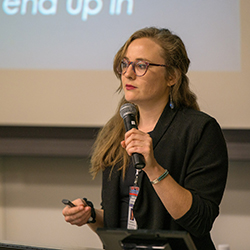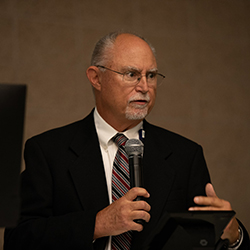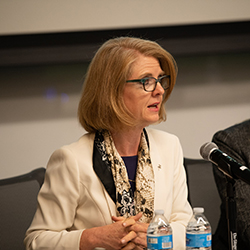Medical School Hosts Inaugural Arizona Primary Care Advocacy Forum
Community leaders, physicians and medical students gathered at the University of Arizona College of Medicine – Phoenix for the inaugural Arizona Primary Care Advocacy Forum to address the critical shortage of primary care physicians in Arizona.

“This program was founded to provide a leadership pathway for student scholars interested in addressing the key challenges in our health care system,” said Shahrzad Saririan, MD, founder and inaugural director of this innovative program. “Our longitudinal four-year program allows students to participate in primary care seminars, relational leadership training through Primary Care Progress and ongoing community-based projects to understand their unique role as future physicians.”
Organized by the Primary Care Scholars students, this inaugural event focused on the concerning trend and the risk it poses to the health and wellness of local and regional communities.
“The shortage of physicians is a national problem, but it disproportionately affects us in Arizona,” said Guy Reed, MD, MS, dean of the College of Medicine – Phoenix. “As we know from the Arizona Center for Rural Health, we currently need 563 primary care physicians. In another 10 years, we will need 1,941 more. Citizens in rural counties in Arizona already acutely feel this need. Unless we make a change, every citizen in every county in Arizona will feel these effects in the next few years.”
According to statistics provided by second-year Primary Care Scholars medical student Michelle Peterson, for every primary care provider in Arizona, there are 1,678 patients. In isolated rural areas, there are 10.3 providers per 100,000. Typically, a primary care patient workload should not exceed 1,500 to 2,000 patients; however, in small, rural towns, there are 9,872 people per primary care provider.

Peterson said Arizona ranks 31st out of 50 states in active licenses, but 42nd in active primary care providers.
“In Arizona, there are not enough primary care providers to meet the daily demand of patients,” she said. “Most of these physicians are practicing in urban areas. As the location gets more rural, there are fewer specialists and fewer primary care physicians.”
The event included a discussion by a panel of experts: Heather Carter, EdD, Arizona state senator; Kelli Butler, Arizona state house representative; Jonathan Cartsonis, MD, director of the college’s Rural Health Professions Program; Katy Mullens, MD, pediatric and adolescent medicine specialist and clinical professor; Glen Fogerty, PhD, associate dean of Admissions and Recruitment; Merrion Dawson, a second-year Primary Care Scholars medical student, and Cheryl O’Malley, MD, associate dean of Graduate Medical Education.
“We are already at a shortage in Arizona, but I’m here to tell you the crisis is even worse than what those numbers show,” Sen. Carter said. “We have a very large population of practitioners who move to Arizona, but are retired and want to maintain their license. When you look at just the numbers reported from our licensing board, that does not give us an accurate number of the people who are seeing patients on a day to day basis.”

Rep. Butler discussed the need for more education and public health funding in Arizona to address the need. Arizona is the third worst in public health funding, she said, at the “bottom of the barrel” in education funding, and one of the worst states for an increasing number of children who are uninsured.
“These statistics are very alarming, and I think it is important to know that there are people at the Capitol who recognize the glaring problem that we are facing now,” Butler said.
Although most of the conversation was centered around medical students, Dr. O’Malley discussed the need for more residency spots in Arizona. When Dr. O’Malley graduated from the College of Medicine – Tucson in 1999, she said, there was only one medical school in the state, and there were 100 spots per class, with 400 students enrolled in medical school. In 2016, the number was 2,200. However, graduate medical education hasn’t kept up with this demand.
“There is more growth ahead,” Dr. O’Malley said. “We have all these fabulous medical students with energy that are coming here and will have opportunities training in our medical schools, but then they have to go into residencies. We are fortunate to be able to groom them into primary care, but we need to be able to keep them and have a home for that. We know if they do their undergraduate medical education and then their graduate medical education in Arizona, then it’s a 75 percent chance that they are going to stay and practice in the state.”
The panel ended with a discussion with the audience, where experts and attendees agreed that more work needs to be done to address the ongoing crisis.
“We still need primary care doctors. If we don’t do everything we can to prepare that next generation of practitioners, we are going to be in dire straits,” Sen. Carter said.
About the College
Founded in 2007, the University of Arizona College of Medicine – Phoenix inspires and trains exemplary physicians, scientists and leaders to advance its core missions in education, research, clinical care and service to communities across Arizona. The college’s strength lies in our collaborations and partnerships with clinical affiliates, community organizations and industry sponsors. With our primary affiliate, Banner Health, we are recognized as the premier academic medical center in Phoenix. As an anchor institution of the Phoenix Bioscience Core, the college is home to signature research programs in neurosciences, cardiopulmonary diseases, immunology, informatics and metabolism. These focus areas uniquely position us to drive biomedical research and bolster economic development in the region.
As an urban institution with strong roots in rural and tribal health, the college has graduated more than 1,000 physicians and matriculates 130 students each year. Greater than 60% of matriculating students are from Arizona and many continue training at our GME sponsored residency programs, ultimately pursuing local academic and community-based opportunities. While our traditional four-year program continues to thrive, we will launch our recently approved accelerated three-year medical student curriculum with exclusive focus on primary care. This program is designed to further enhance workforce retention needs across Arizona.
The college has embarked on our strategic plan for 2025 to 2030. Learn more.